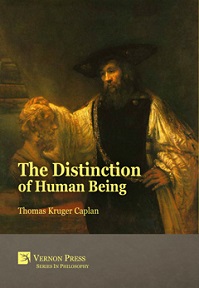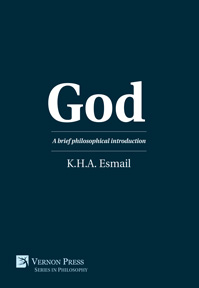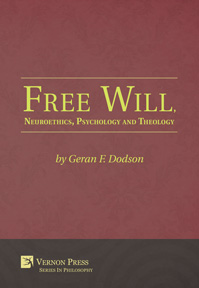The Impact Of Reason On Faith, Ethics And Belief
by Geran F. Dodson (University of North Georgia)
Purchase this book
(click here to change currency)
"The relationship of philosophy and theology is a perennial conundrum. Professor Dodson ventures boldly into the dialogue by examining it from a number of different though inter-related viewpoints: Biblical covenants, faith and belief, philosophical and theological ethics, the particular logic of theology, and a number of views of the identity of God. In addition to religious and philosophical ideas, he effectively brings psychology and sociology into the conversation. This sounds complex, and it is. But Dodson also manages to make this discussion accessible to laypersons interested in these issues, especially those who want to think more seriously and reflectively about religious faith and are dissatisfied with Biblical literalism and uncritical theological pronouncements. The book gives such readers tools to assist in that struggle by synthesizing many important perspectives and exploring practical illustrations."
Joseph T. Reiff, Floyd Bunyan Shelton Professor of Religion
Emory & Henry College
"The author has an incredible command of language and uses his understanding of logic and theology to guide the reader on a journey through the biblical covenants with God. There is a critical description of the legal, spiritual, and physical aspects of a covenant that helps to contextualize the analysis of God’s promises and the interpretations of God’s relationships with notable figures such as Abraham, Moses and Jesus.
"A clear methodological lens is employed to examine scripture.
"Hermeneutical method in fact is a great choice for this exploration because it traditionally has been associated with the analysis and interpretation of spiritual texts. The author employs the use of logic as a way to understand and interpret the relationship between God and humanity. Each covenant represented a promise, yet there were inconsistencies within the promises. The inconsistencies represent the places where logic ends and religious faith ensues. It was particularly interesting to review the differences between individual covenants and generational covenants. This helped to explain the legacy of Israel and the assumed divine rights that stem from their generational covenant with God. In the end, the reader is cast into an open sea of possibilities to dissect the nature of belief and the human desire to have a connection with God.
"The text would appeal to an intellectual audience, scholarly as well as religious community; along with an average person who enjoys philosophical debate. The analysis is intriguing and could spark great philosophical debate that could serve to influence religious research and enhance biblical understanding for theologians."
Stephanie J. Hawkins, PhD
Director of Teaching & Learning MAT
"[...]The work is helpful for those who want to begin their own reconciliation of reason and Christianity, or religions in general, by challenging conventions people take for granted with either."
Charles Rozier
Philosophy Instructor University of North Georgia
"Dodson’s approach to the relationship between philosophy and theology emphasizes ethics and reason. He challenges the reader to think objectively about traditional theological claims and to apply ethical reasoning in examining such claims. The clash between philosophy and theology is most evident when theological assumptions of divine insight are assessed from this philosophical perspective. With wide-ranging research and sound exegetical methodology, he begins with the covenants of the Old Testament, weaves his way through the gospels and writings of Paul, and argues for the establishment of the Jesus Covenant as the final covenant in the relationship between God and humanity.
"In the process, he treats us to a detailed analysis of the use of logic in scripture and the challenges deductive reasoning provide for proof of the existence of God. The sections dealing with the origin and identity of God are backed up with sound scholarship and firmly establish his perspective as to the origin, nature, and identity of the Biblical God. His writing, although technical at times, is clear; the text flows smoothly from one subject to another, and the stated purpose is achieved in all respects.
"This is a must read for anyone seeking a deeper understanding of a philosophical approach to understanding theology."
Mary Rose Kasraie, PhD
Cobb County Campus Strayer University
The purpose of the book is to examine the theological claims of ethics, faith and belief from a philosophical perspective. The Abrahamic and Mosaic covenants of the Old Testament, Jesus of the synoptic gospels, and Paul’s writings serve as the frame of reference in examining a biblical expression of reason and structured logic.
The message of Jesus centered on the Kingdom of God, defined the meaning of faith and belief, established a new ethic, and framed the message in logic forms. The life and death of Jesus brought the realization of God’s final covenant as prophesied by the Old Testament. However, Paul appropriated and developed the Jesus of history into the mythological eschatological Christ figure.
The clash of philosophy and theology is evident with theological presuppositions that are based on spiritual insight and divine revelation. Logic in scripture employs propositions based primarily on revealed proof that is within the context of that which cannot be proven absolutely.
Uncovering the identity of YHWH in the manuscripts and religious practices of Canaanite culture clearly associated YHWH with the polytheism of the Ugarit texts. YHWH was one of the seventy sons of the Canaanite Most High God El and took on a unique identity that was rooted in El and the polytheistic nature of the pantheon of gods.
Theological truths stand within the context of faith and reason stands apart from faith and infers only that which can be proven based on evidence. That which is knowable by faith cannot be known by reason since reason cannot validate that which is not proven to exist.
Introduction
I. The Abrahamic and Mosaic Covenants
A. A History of Covenants
B. Abraham
C. Moses
D. Understanding the Covenants
II. The Jesus Covenant
A. The Early Life of Jesus
B. The Message of Jesus
C. Terms of the Jesus Covenant
III. The Covenant According to Paul
A. A Theology of the Christ
B. Terms of the Pauline Covenant
C. An Assessment
IV. Faith and Belief
A. Abraham
B. Moses
C. Jesus
D. Paul
E. Theology and Faith
F. Faith, Belief, and the Jesus Covenant
G. Faith and Belief Today
H. A Sociological Examination of faith and Belief
I. Mainline and Non-Denominational Churches
J. A Model for the Twenty-first Century Church
V. Ethics
A. Philosophy and Ethics
B. Abraham and Ethics
C. Moses and Ethics
D. The Ethics of Jesus
E. Pauline Ethics
F. Closing Thoughts
VI. Logic and Theology
A. The Nature of Logic
B. The Use of Logic in Scripture
i. Conditional Logic
ii. Cause and Effect
iii. Hypothetical Syllogisms
iv. Inductive Logic
v. Deductive Logic
C. Theological Arguments
D. The Nature of Theological Language
E. Final Thoughts
VII. Understanding God’s Identity
A. Ugarit, El, and Yahweh
B. Anthropomorphism and God
C. Evolutionary Psychology of Religion
D. The Atheists
E. New Religious Movements
F. God’s Identity
VIII. A Synthesis
A. Religion and Identity
B. Psychology of Belief
C. A Reasoned Observation
Notes
Bibliography
Geran F. Dodson is an adjunct professor at the University of North Georgia, Gainesville, GA, and Strayer University, Atlanta, GA. An instructor in the College of Arts and Letters and the College of Business at both universities, he teaches Philosophy, Religion, Humanities, Economics, and Business. His degrees include the Bachelor of Arts from Millsaps College, Jackson, MS; Master of Divinity, Lexington Theological Seminary, Lexington, KY; Master of Business Administration, Emory University, Atlanta, GA; and Post-graduate studies in New Testament, Emory University, Atlanta, GA.
Philosophy, religion, covenants, ethics, El, Ugarit, logic, reason, anthropomorphism, synoptic gospels, psychology of religion, psychology of faith, biblical language, scripture, identity of God
Subjects
Philosophy
Series
Series in Philosophy
Related services
Find in a library near you Download HQ cover Find in Bookshop.orgSee also
Bibliographic Information
Book Title
The Impact Of Reason On Faith, Ethics And Belief
ISBN
978-1-62273-074-2
Edition
1st
Number of pages
211
Physical size
236mm x 160mm

![The Impact Of Reason On Faith, Ethics And Belief [Paperback]](/file/1423/e3409c2a3610bab5f3e5fa72f5442148/1458043080.jpg)






